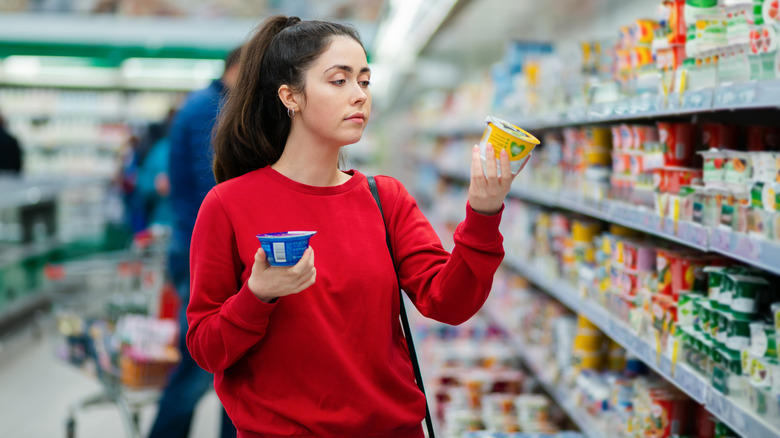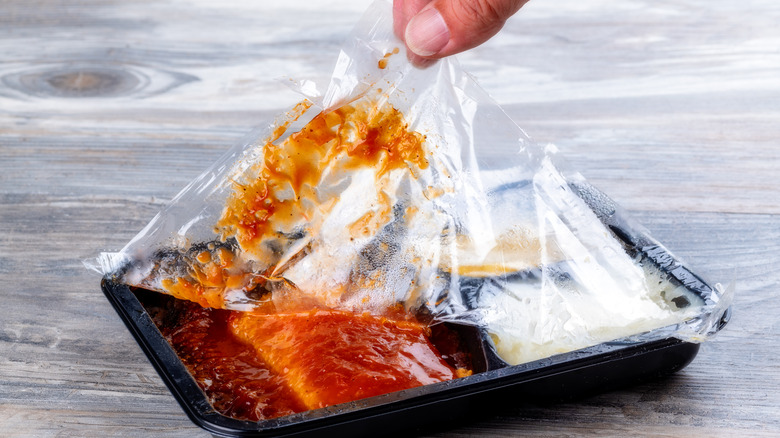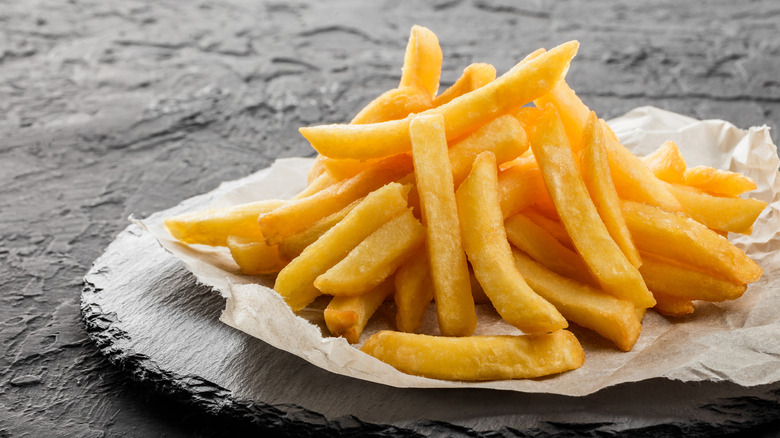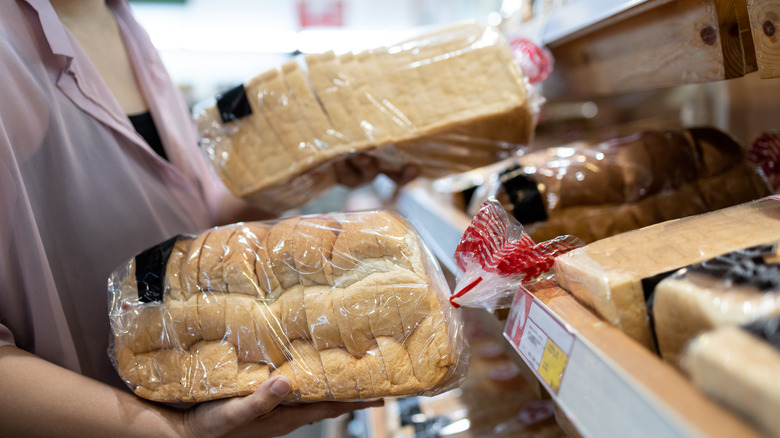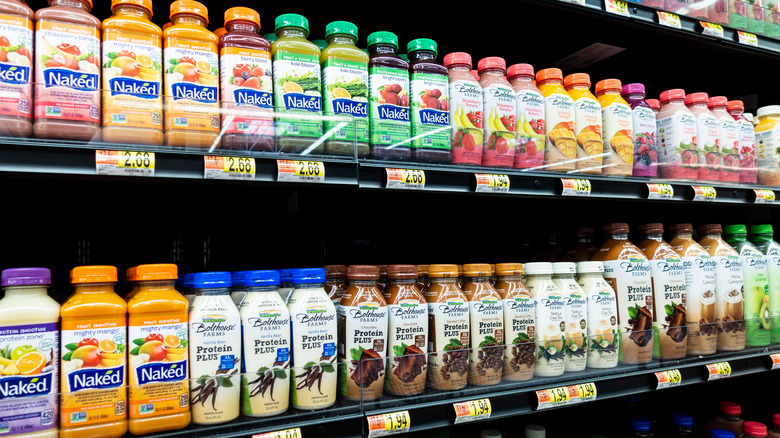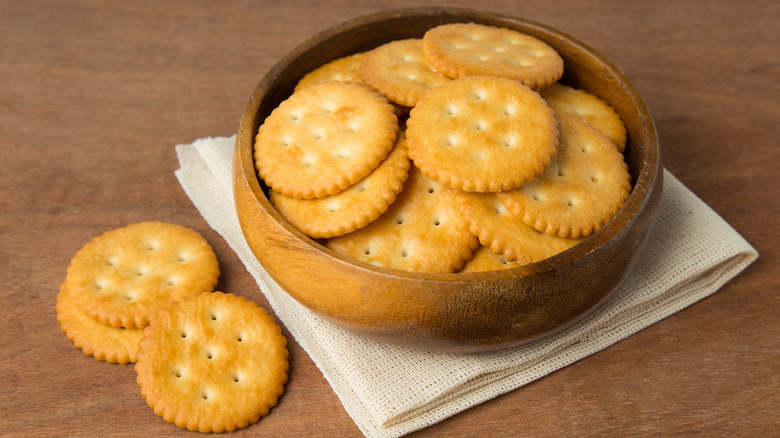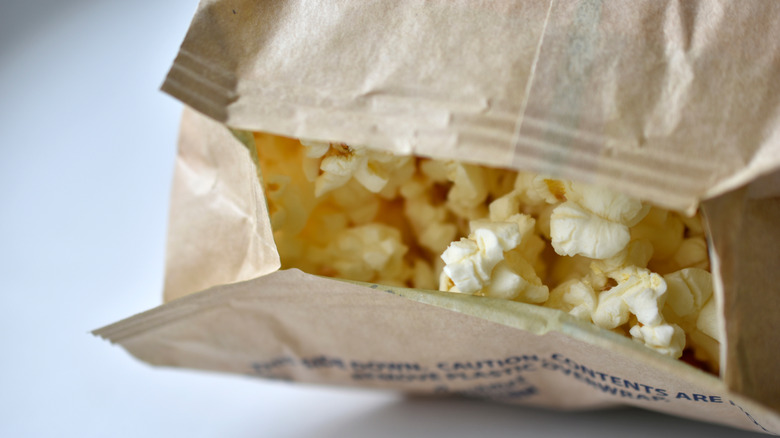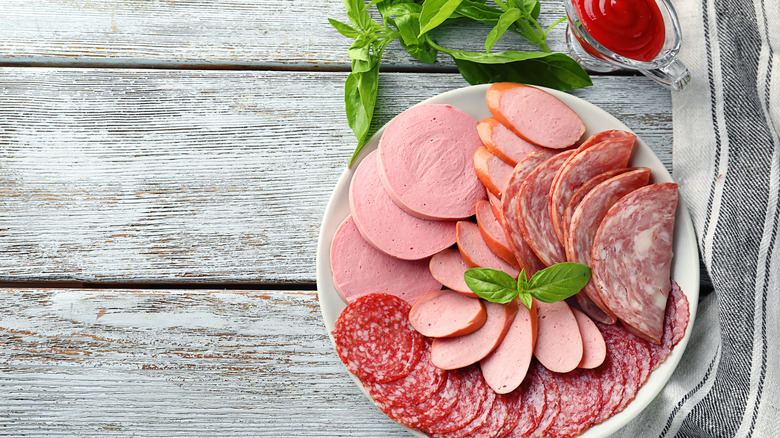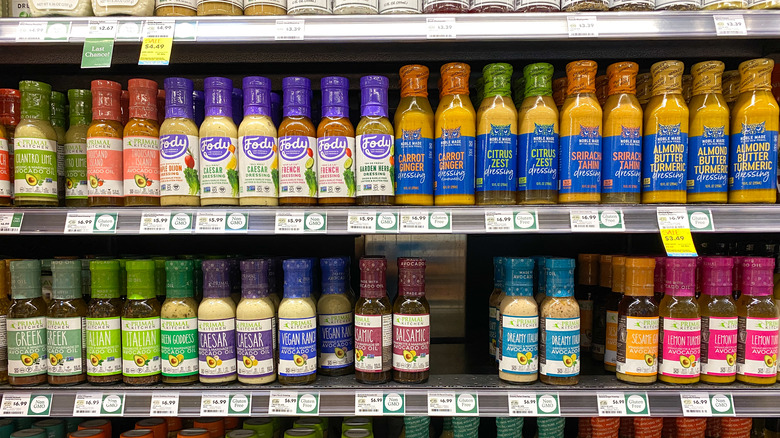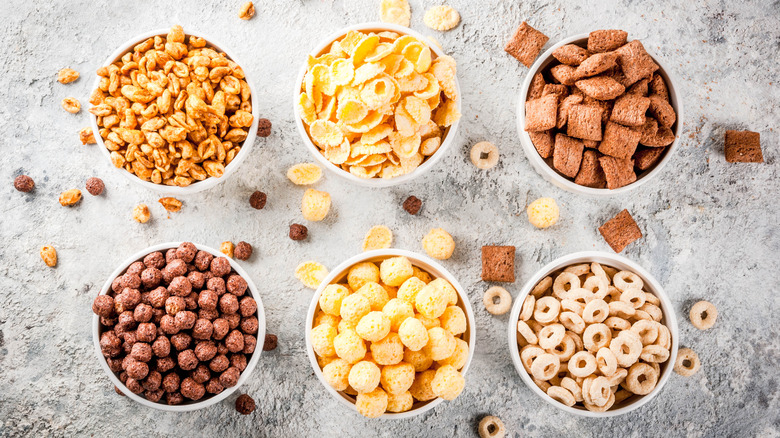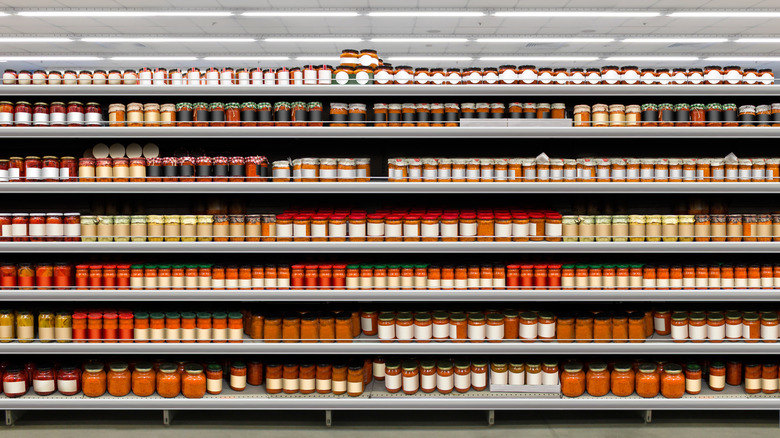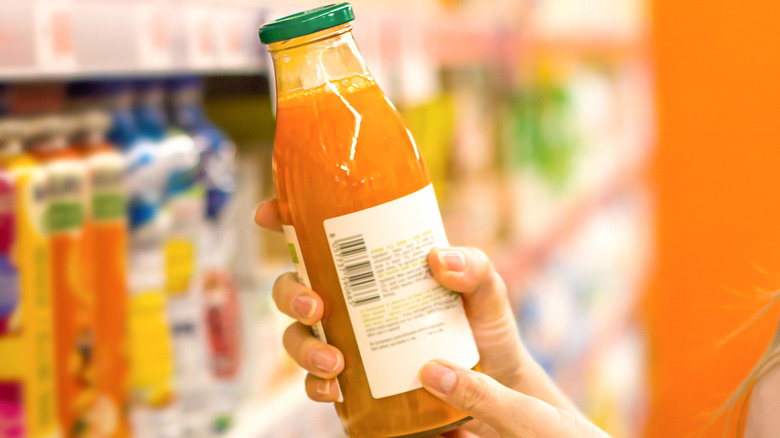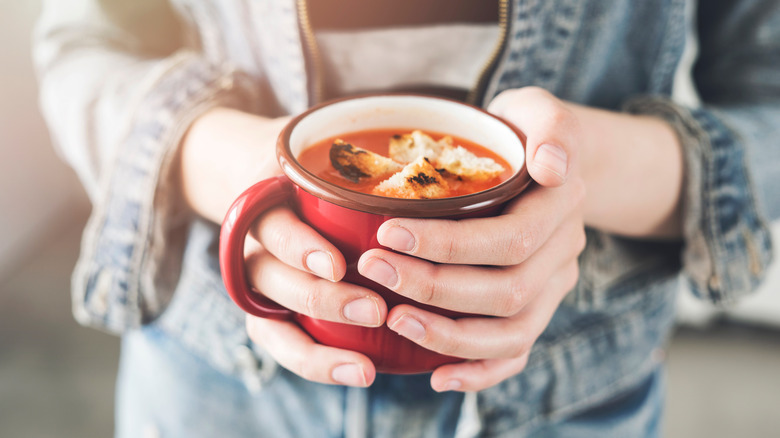Always Check The Label Before Buying These Foods
Do you know what's in your food? Too many of us know the feeling of grabbing a snack or food item from the store and eating half of it before we even think to check the label. And although nutritional information has been required to be displayed on food items since the Nutrition Labeling and Education Act was passed in 1990, over 40% of people still don't always check nutritional labels when buying food at the store, according to a survey from the International Food Information Council Foundation.
While this may not be a huge problem for some, for the health-conscious or those seeking to stick to the recommended Dietary Guidelines for Americans, not checking the label could mean you're eating things you might not want to. And what's more, food items that we assume to be healthy or good for us in one way may contain ingredients that tip it into seriously unhealthy territory in another. Let's take a look at some of the most common — and unlikely — culprits.
Yogurt
Beloved by people around the world, yogurt is normally considered one of the healthiest things you can eat. But when's the last time you checked the label? While yogurt is well-known for its high-protein and high-calcium nature and its benefits to your gut health, according to Medical News Today, food manufacturers can often turn their products into a far less healthful treat by pumping huge amounts of sugar into them. According to WebMD, some low-fat yogurt brands can have as much as 33 grams of sugar per serving — as much as two scoops of ice cream.
And even if your yogurt looks healthy, or is Greek, that's no assurance that it'll be less sugary. "Greek yogurts and Skyr can be lower in sugar thanks to the straining process, but that's not a given," Jaclyn London, certified dietitian nutritionist and nutrition director of the Good Housekeeping Institute, told Good Housekeeping. When you're shopping for yogurt, make sure you're going for something that limits added sugars as much as possible, has the fewest added ingredients, and ideally contains live cultures, advises Healthline.
Frozen dinners
Most people know that picking up a frozen dinner probably won't be a healthier choice than cooking something yourself, but sometimes the convenience they offer can't be beaten. That convenience can come at a cost, though, as frozen foods can be a hotbed for sneaky ingredients you'd rather avoid. What's particularly troublesome is the level of hidden fats in some of these foods, with Everyday Health pointing out that prepackaged meals can often be loaded with saturated fats.
Given that registered dietitian and University of Virginia School of Medicine researcher Anne Wolf says we're often "eating well over what we need" when it comes to fats, consuming unneeded additional sources from these meals won't help (via Everyday Health). These fatty frozen foods can up your risk of developing heart disease, points out Eat This, Not That – and that's before you take the high sodium levels of many of these products into consideration.
French fries
We don't think that anybody's fooling themselves into thinking that french fries are a health food, but aside from the high amount of fat these deep-fried potatoes deliver, there's another reason to check the label. French fries can be an unlikely source of ingredients that can cause an unpleasant reaction due to food intolerance or allergy. The Celiac Disease Foundation points out that french fries can sometimes be coated in batters containing wheat, or else have cross-contact with fryers, raising the risk for people with celiac disease or gluten intolerance.
For those with a peanut allergy, it's also worth keeping an eye out. While highly refined peanut oil manufactured in the U.S. is frequently used to deep-fry food, it is generally safe for people with peanut allergies to consume (per Food Allergy Research & Information). However, problems can arise when the peanut oil is made elsewhere. "The interesting thing about peanut oil is that when it's made in the U.S. it is so refined that almost nobody with a peanut allergy would react to it. But the problem is we don't know if it is one from China, which are much less refined," immunologist and allergist at New York University Langone Medical Center Sujan Patel told Health. If you have a peanut allergy or any allergy, it's especially important to check labels carefully. Opting for french fries cooked in sunflower, canola, or olive oil can be a better choice (via Everyday Health).
Bread
In its most basic form, bread has literally two ingredients: flour and water. As such, it might be a bit surprising that bread needs a nutrition label. But in fact, bread can be a pretty subtle vehicle for some things you'd want to avoid. Part of the reason why bread tastes so delicious – apart from its carby goodness — comes down to salt. Some brands clock in at 230 milligrams of sodium per slice, according to the Cleveland Clinic. That means that just one slice of bread can account for 10% of your daily recommended sodium intake limit, per the 2020-2025 Dietary Guidelines for Americans.
It's important to remember that nutritional information refers to one serving size. As hypertension specialist George Thomas told the Cleveland Clinic, "If you eat more than the listed serving size, you'll consume more sodium." And let's be real, how often do we just eat one slice?
Smoothies
The go-to snack of many a health fanatic, the smoothie is a symbol of all things virtuous. However, that's not always the case. Bonnie Taub-Dix, registered dietitian nutritionist and author of "Read It Before You Eat It: Taking You From Label to Table," told Openfit, "Smoothies sound like a great way to add some fruit into your diet, but they can be real calorie bombs if you're not careful."
In addition to the fruit in smoothies, which already delivers sugar, these drinks can be loaded with syrups and table sugar. What's more, it can be easy to miss this when smoothie companies are using health industry buzzwords to indicate that their products are wholly virtuous. Take Jamba Juice's Pumpkin Smash smoothie, for example. Despite having the attractive term "plant-based" in its branding, this drink is far from your friend, nutritionally speaking. A large size contains a frankly jaw-dropping 86 grams of sugar, 24 grams of saturated fat (120% of your daily recommended amount), and 780 calories (per Jamba Juice).
This serves as a reminder that checking food labels needn't just happen in the grocery store – many restaurants have their nutritional information online, and checking before you buy can make sure you're making the right choice for you.
Crackers
It's hard to picture a more inoffensive food than a humble cracker. But these simple snacks can contain ingredients that can take them into unhealthy territory pretty darn quickly. Some brands contain rather high levels of sodium (Ritz Crackers, for example, can deliver 5% of your recommended daily sodium intake in a small serving size of just five crackers). Crackers often contain high fructose corn syrup, an ultra-concentrated solution used as a sweetener. Both Ritz Crackers and Club Crackers, for example, list high fructose corn syrup as an ingredient.
When it comes to nutrition, medical professionals are unequivocal in their dislike of high fructose corn syrup. According to Mark Hyman, functional medicine expert, the syrup "contributes to diabetes, inflammation, high triglycerides, and something we call non-alcoholic fatty liver disease" (via Cleveland Clinic). Additionally, the fructose in the corn syrup goes straight to your liver, according to Hyman, and can stimulate cholesterol production, raising their levels and putting you at increased risk of heart disease.
Popcorn
As a whole-grain, high-fiber, low-calorie food, popcorn should be the ideal snack (via American Heart Association). But, not all types of popcorn are created equal. The taste of microwave popcorn can come at a high nutritional cost, according to Erika Fox,, a registered dietitian nutritionist at 310 Nutrition. She told Eat This, Not That that "many brands often load their products with additives, artificial ingredients, extremely processed oils, a lot of salt, and more." Fox pointed out that the saturated fat content of many microwave popcorns can be a particular cause for concern, with some brands containing over a quarter of your daily recommended intake in a small serving. And remember, the bag size is not the serving size most of the time!
Certain options, like Jolly Time's The Big Cheez and Pop Secret's Double Butter Popcorn, can contain endless lists of additional ingredients, high levels of saturated fat. and a ton of sodium per serving. Double Butter Popcorn, somewhat perplexingly contains no fiber whatsoever (via Eat This, Not That). As Fox explained, "When it comes to [buying the healthiest] microwave popcorn, my recommendation is to find one with minimal ingredients." That'll keep the emphasis on the good stuff.
Deli meat
It's vital to get adequate levels of protein in your diet, with the nutrient serving as the building block for our bodies themselves (via Healthline). Grabbing a pack of deli meat is a quick way to boost your protein levels, but deli meat frequently has high levels of sodium and saturated fat, according to the Cleveland Clinic.
Deli meat can also often be a source of nitrites in the diet, due to the addition of the preservative sodium nitrite, which can also help to give the meat a more pinkish hue (via Live Science). Although sodium nitrite has long been dogged by controversy in the nutrition world, growing evidence suggests that nitrite consumption is generally safe for the majority of people. However, cooking nitrite-rich foods like bacon can create dangerous carcinogenic nitrosamines.
If you're concerned about sodium nitrite, choosing an option that is nitrite-free is wise. You should also seek out choices that are low in sodium and saturated fat, as sodium nitrite may not be the worst aspect of the food after all.
Salad dressing
How much harm can a simple salad dressing cause? Well, it turns out there are a few ingredients in bottled salad dressings that can be troublesome for your health. Dressings, particularly vinaigrettes, can often contain mustard as a flavoring, which can be dangerous for those with a mustard allergy, according to the Government of Canada. While some people can just have a mild reaction to mustard, those with particularly severe mustard allergies need to check any salad dressing label before buying, as some reactions can be dangerous and potentially life-threatening (per WebMD).
Even if you don't have an allergy, it's still wise to check the label of your salad dressing. Many seemingly healthy products can be loaded with ingredients that are less than ideal, like sodium, saturated fat, and sugar, according to Harvard Health Publishing. If you want to keep an eye on your salad dressing's ingredients, the simplest thing to do is to make your own by rustling up a basic vinaigrette at home.
Breakfast cereal
While cereal boxes are often festooned with labels touting their vitamin-rich or high-fiber qualities, they're also often completely laden with sugar. A bowl of Cocoa Krispies is comprised of around 38% pure sugar, with a 40-gram serving containing 15 sugary grams, according to Love Food. And believe it or not, that's not even the worst offender, with Honey Smacks delivering 18 grams per 36-gram serving, meaning that half of your bowl is just sugar.
But never fear, breakfast cereal can be a healthy choice — provided that you're checking the label and picking the best options. As NBC News pointed out, when it comes to selecting a morning cereal, it's best to check whether it's 100% whole grain. The higher in fiber it is, the better, with ideally 3 grams or more per serving. You should also try to keep the sugar content as low as possible, at 6 grams or fewer.
Pasta sauce
A simple red pasta sauce, chock-full of healthy tomatoes, is not the kind of thing to immediately raise eyebrows. But quiet additions to jarred pasta sauces can take a product from healthy to harrowing — making checking the label all the more essential. The first thing to look out for is sodium, as pasta sauces are often loaded with salt. In fact, a single serving of some red sauces amounts to over 20% of your daily sodium allowance (via Healthy Food). With a chronic high intake of sodium being a large factor in high blood pressure, keeping an eye on your sodium levels is vital, according to the CDC.
But that's not the only thing to keep an eye on. Many pasta sauces can contain added sugars that bump them into unhealthy territory. Emeril's Tomato and Basil Sauce (which also has a pretty high sodium level), contains questionable fats like soybean oil. Diets higher in soybean oil and other omega-6 fats and lower in omega-3 fats have been found to be more likely to promote obesity, per a study in Nutrients.
Fruit juice
Fruit juices are naturally higher in sugar than most drinks, being made up of foods that are comprised of, well, mostly sugar. But fruit juice companies can bump up the sweetness of their drinks with added sugars to the point where a glass of fruit juice can contain the same levels of sugar as the equivalent amount of regular soda, according to Healthline. However, the site points out that fruit juices deliver vitamins and minerals that soda does not. Despite being made of fruit, fruit juices can often be much lower in fiber than you'd think, as it is stripped away when the fruit is turned into its liquid form.
While consuming foods higher in sugar now and again as part of a balanced and healthy diet won't do much harm, frequently consuming a lot of sugar can cause problems. As well as contributing to acne and weight gain in the short term, a high intake of sugar on a long-term basis can increase your risk of cardiovascular disease, cancer, and high blood pressure, according to Medical News Today.
Powdered soups
Powdered soups may be an easy, low-fat snack, but certain additions can be made to them which makes checking the label essential. Some powdered soups contain milk powder or products, according to both the Food Standards Agency and John Hopkins Medicine. While John Hopkins Medicine points out that this can be problematic for anyone with a milk allergy, it could also raise concern for anyone with lactose intolerance, which affects anywhere between 30 to 50 million American adults in some form, per the National Institute of Child Health & Human Development.
And there may be something even more harmful sitting in your sachet. Instant and powdered soups can often contain a sky-high sodium content. Take Mitoku Instant Miso Soup as an example, which contains a whopping 880 milligrams of sodium per serving (via Healthy Food). That's 38% of your daily allowance in one go.


